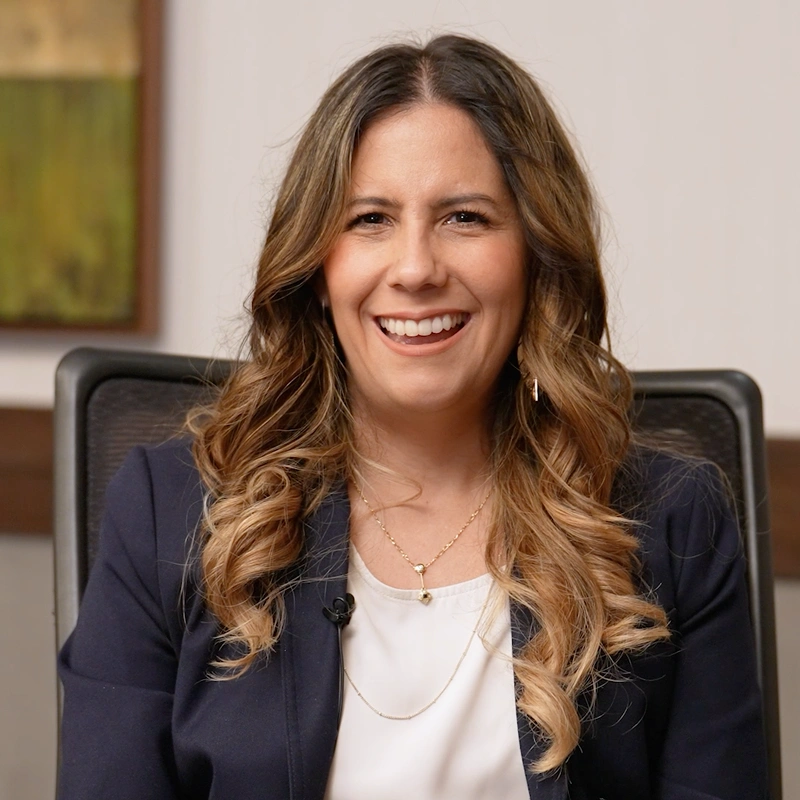Catalina Perez is a bilingual and bicultural clinician at the Children’s Advocacy Center of Suffolk County. Perez is the Director of Mental Health and Advocacy. In her role, she is trained in and offers consultation on two evidence-based therapeutic interventions, Child and Family Stress Intervention (CFTSI), and Problematic Sexual Behavior-Cognitive Behavioral Therapy (PSB-CBT). She also serves as a consultant to the multidisciplinary team for her CAC.
Originally from Colombia, Perez has volunteered and held positions working in the Latino community before working at the CAC of Suffolk County. “By doing that work, I learned how tough it could be for immigrants and for folks raising children in this country,” she explained.
In her current role, Perez leads a team of driven mental health clinicians who set out to provide the highest level of care to children and families who disclose child abuse in Suffolk County. “We take the work that we’re doing with our families very seriously. We want to make sure that we provide the best service that we can,” Perez said. “Leading a team that is so passionate about this work is quite a privilege.”
Perez also is responsible for ensuring that her clinicians are continuously supported in their roles. “Working in this field you face different challenges, from how you provide enough support and containment for clinicians, ensuring that we have systems in place that facilitate the work that clinicians are doing. While also making sure that we keep up with the demand that we have in our county, which is quite high.”
Being able to work with Spanish-speaking families is at the core of why Perez became a clinician. “I wanted to make sure that I could use my Spanish to provide services.” Suffolk County has a large Spanish-speaking population, many of which are immigrant families as well as undocumented families. For the latter, there’s always a fear of sharing documentation status.
Perez ensures these families that she is just here to help them and their child with the trauma and the things that happened.
One of the major obstacles for CACs in Massachusetts is the lack of bilingual, bicultural, and trauma-informed clinicians; something that the CAC of Suffolk County is very proud to have. “There is a huge need for Bilingual clinicians. We need to make sure that people can fully engage in conversations with families,” Perez said.
“The demand is still pretty high. It’s really sad to hear that there is a waitlist of 6 to 9 months. On top of that, if there is a need for a Bilingual clinician, the waitlist can be even longer than that. In the life of a child, 6 to 9 months is a long time and many things can happen with the children that we work with.”
Ensuring Spanish-speaking families that their therapist is going to understand them is one less thing they need to be concerned about. “Having these conversations and allowing the families to speak in their native language offers a tremendous amount of support and containment,” Perez added.
One of the more recent developments in Perez’s work is expanding services for younger children at the preschool level within the Problematic Sexual Behavior Cognitive Behavioral Therapy (PSB-CBT) initiative. This initiative assists children who have initiated a PSB against another child. “I think people underestimate how much we need PSB services for children. Just like child sexual abuse is taboo, when things happen among children, it’s something that is unheard of, but it happens more frequently than we think,” Perez stated.
“We’re doing a lot of education in the community to make sure that people know about PSB and how we handle cases with kids that engage in these types of behaviors. At the end of the day they are children, we don’t want people to call them offenders or perpetrators or any negative derogatory terms people might use.”
The CAC of Suffolk County is seeing an increased demand for PSB referrals after expanding to the preschool program. Historically, the CAC has only been able to offer Mental Health services to children ages seven and up, yet with the expansion of the preschool program, a younger demographic is now able to receive services.
“For PSB-CBT for preschoolers, the majority of the work is with the caregiver,” Perez explained. “Oftentimes, caregivers need someone who is telling them ‘You can do this.’ Because being a parent is hard, period. Being a parent with a child who is struggling with this particular behavior is even more challenging. It’s so great that families and caregivers can come to us and ask “Is this a typical behavior of a 5-year-old? Or is this more concerning and what do we do?”
Perez hopes to offer more modalities of PSB-CBT treatment in the future but remains focused on expanding services to younger children and continuing to expand her community’s knowledge about child sexual abuse and PSB.
“Child sexual abuse could happen to any child. It doesn’t discriminate. Often we are more concerned about stranger danger. Caregivers need to speak sooner to their children about how to keep a safe body. It’s never too early to start having conversations with your children about what’s safe and what’s not.”
